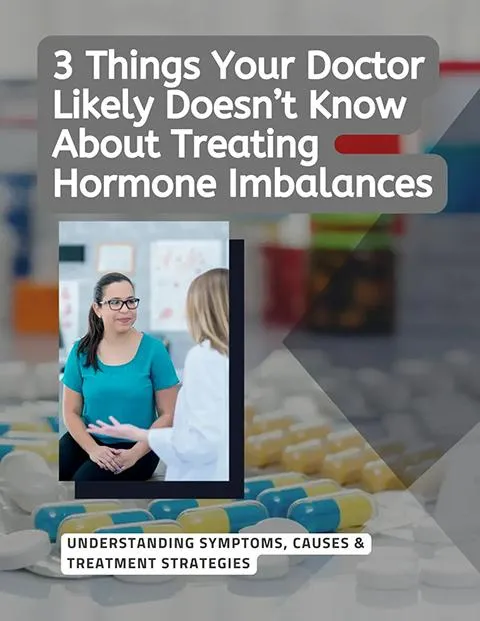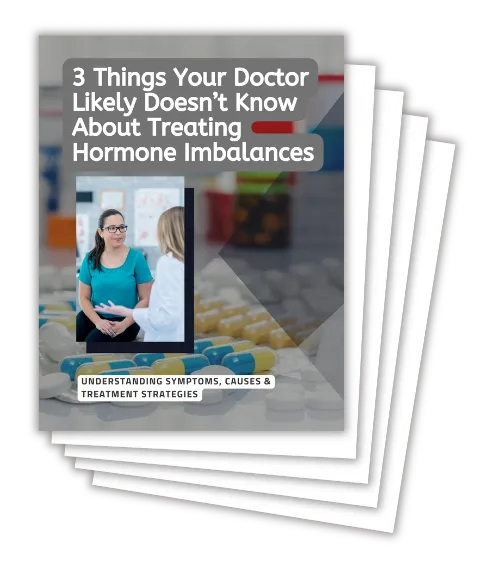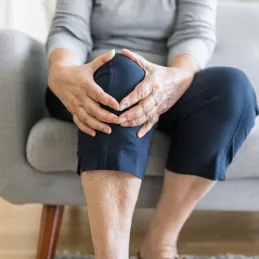3 Things Your Doctor Likely Doesn’t Know About Treating Hormone Imbalances

This report outlines 3 things your doctor likely doesn’t know about treating hormonal imbalances.
As scary as this sounds, it is unfortunately true that most doctors (and even some OBGYNs) don’t know how to treat hormonal imbalances confidently.
Doctor’s all over the world are telling patients suffering from hormonal imbalances that “your labs are normal” or “it's just a matter of aging.”
They are unsure how to help patients suffering with debilitating hormonal imbalances... especially during perimenopause and menopause.
WHAT I WISH EVERYONE KNEW ABOUT HORMONE IMBALANCES
This Essential Guide Will Show You…

WHY common medical advice often fails to address the root cause of hormonal imbalances (and why most PCPs and even OBGYNs are ill-prepared to address your concerns)
HOW to recognize common signs & symptoms of hormonal imbalances
HOW to find and choose the right healthcare provider for hormonal imbalances
WHICH hormone testing is best for identifying imbalances and developing personalized treatment plans
WHAT you need to know about bioidentical hormone replacement therapy (BHRT) for restoring energy, mood, and drive
Meet Dr. Suzzane Gosselin, BSN, DC, IFMCP

Dr. Gosselin has been in the healthcare field for over forty years.
Her experience spans diverse settings from working in Intensive Care Unit settings in major world-renown metropolitan hospitals to Community Health Nursing in Boston’s inner city to becoming a licensed Chiropractor and CEO of Harbor Health Group.
Dr. Gosselin started her formal education with the Institute of Functional Medicine (IFM) in 1999 and became an Institute of Functional Medicine Certified Practitioner in 2014. She has worked with the Institute serving as a Clinical Facilitator at the Applying Functional Medicine in Clinical Practice programs.
Forever the perpetual student, Dr Gosselin continues to learn and advance her understanding of physical medicine, functional nutrition and stress resilience by attending advanced trainings and conferences on a regular basis. To balance her clinical life, Dr Gosselin spends time in the garden, on the water and serving on various Boards in her community.
How Long Have You Been Concerned About Your Bone Health?

Declining Bone Density

Fear of Fractures

Limited Activity

Balance Issues

Loss of Height

Back Pain

Poor Posture

Reduced Independence
HERE'S WHAT MOST PEOPLE DON'T KNOW...
3 Misconceptions About Bone Health

"Bone Loss is Just Part of Aging"
Accelerated bone loss isn't normal or inevitable with age.
Many factors causing bone loss are preventable and treatable through proper nutrition, targeted exercise, and lifestyle modifications. With the right approach, you can build and maintain strong bones at any age. Understanding your unique risk factors and addressing them early can make a significant difference. The key is taking action before a fracture forces you to. Recent advances in bone health science have shown that a comprehensive approach can help slow, stop, and even reverse bone loss in many cases. This is why it's crucial to work with experts who understand the complex factors affecting bone health.

"Medication is the Only Treatment Option"
Lifestyle factors play a crucial role in bone health.
Many natural approaches can help build bone strength, from specific nutrient combinations to targeted exercise programs and stress management techniques. Lifestyle factors play a crucial role in bone health, as everything from sleep quality to stress levels affects bone metabolism and mineral absorption. Most importantly, addressing root causes can prevent further bone loss by identifying and treating underlying conditions like hormonal imbalances, gut health issues, and chronic inflammation. Early intervention and well-designed programs can help you build and maintain strong bones safely and effectively.

"You Can Feel Your Bones Getting Weaker"
Gut issues & stealth infections affect all your hormones!
One of the most dangerous aspects of bone loss is that it's often completely silent until a fracture occurs, earning osteoporosis the title of "the silent disease." Regular bone density testing is crucial for early detection, but standard DEXA scans only tell part of the story - they measure density but not bone quality. Many people don't discover they have weak bones until they experience a fracture, which can be life-altering and severely impact independence. Prevention and early intervention are key, which is why we use advanced REMS scanning technology to evaluate both bone density and quality.